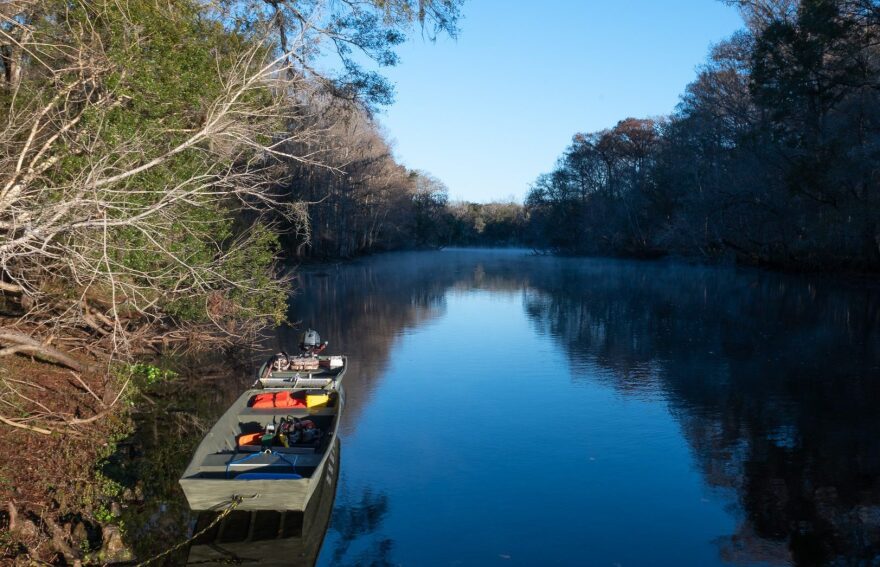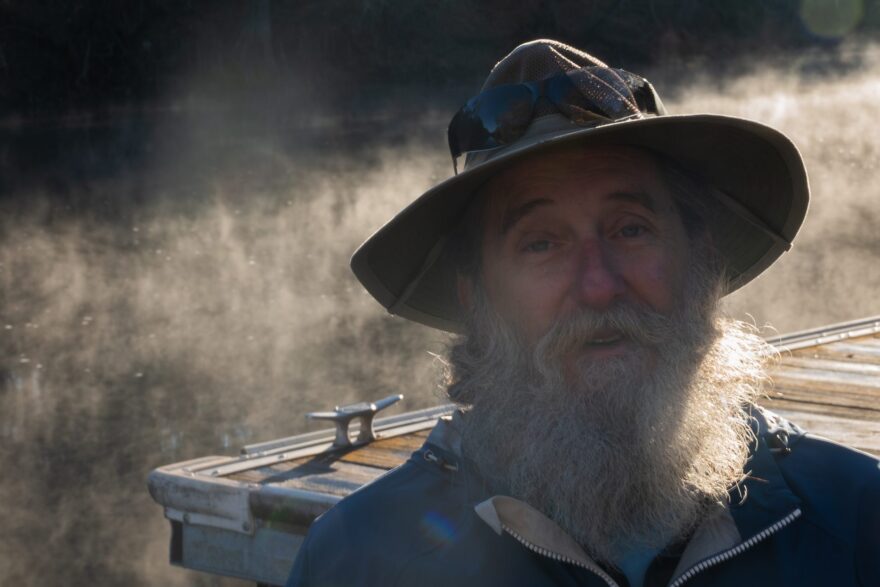Terri Carver laced her hands in her husband’s for reassurance that they were both still there, present in the icy air. They looked at each other, one through thick bifocals, the other from beneath the fold of his soft-brim hat.
“The river saved him,” said Terri Carver. “Now, he’s going to save it back.”
Jo Carver, 60, is a stage 4 cancer survivor who has dedicated his life to the Santa Fe River. His relationship with the Santa Fe started when he was diagnosed with cancer in January 2019. He battled through chemotherapy for two years and six months. Carver said kayaking on the river gave him a vital outlet of tranquility and eventually led to his recovery.
“It’s my job now to give back to the river what the river has given me… my life,” said Carver as he gripped his wife’s hand a little tighter.
Now, he spends every Saturday on the river with a new mission to clean up Florida’s diverse freshwater springs and the rivers that stem from them. For his 60th birthday, his family of volunteers organized a clean-up in his honor.
Carver’s family on the river is complex. They are kayakers and volunteers from organizations across North Central Florida who conduct clean-ups along the Santa Fe River.
Current Problems, established in 1993, is the only nonprofit freshwater debris removal organization in the Southeastern United States, said Nicole Llinas, Current Problems executive director. Llinas met Carver at a clean-up in 2021 and started helping him conduct his clean-ups with another organization Carver belongs to.
Carver was one of the first 50 members who joined Kayak Junkies of Central Florida, a statewide kayaking club that now has 30,000 members. His connections through the club brought 42 people out early on a cold Saturday morning for his birthday.
Event Organizer Tanya Libby of Kayak Junkies was happy to be pulling kayaks down from the rack for Carver.

“I asked him what he wanted to do for his 60th birthday, and he said this,” she said as she adjusted her white sock hat and pink hoodie to protect her from the 34-degree temperatures.
Other kayakers were also prepping for the event alongside Libby. CJ Mays, a member of Kayak Junkies, left her pet iguana, Mikey, at home to save him from the weather. Lisa Young, the operations manager for the club, was shoving HotHands, the air-activated instant warmers, down every article of clothing she had.
Despite the weather and early morning, their conversation was full of energy. The trio was anxiously waiting to get onto the water for Carver.
Carver said that the number of people at the clean-up in his honor was “overwhelming.” Too humbled for words, his wife, Terri Carver, spoke on behalf of her husband at the beginning of the clean-up.
“It means so much to him. He finds so much peace in this crazy world, right there on the river,” she said with tears behind her glasses.

The couple has been through difficult times.
Terri Carver, 65, was born in a small town in Ohio. Her father died eight days before she was born. When Carver was in her 30s, she came to Florida to stay with her great-aunt, who was dying of cancer. Her great-aunt only survived another month and one day. She left her house, car and other personal belongings to her niece. This was not Terri Carver’s first experience losing a loved one to cancer, as her grandfather had died from cancer in 1979.
With her new start in Florida, she started working at a flower shop, eventually becoming a florist. She would meet her future husband there at the shop.
Jo Carver is a Florida-born-and-raised man who quit school at 15 years old to start working. His first job, “laying sod green-side up,” helped him move out of the house when he was 16. He got married at 19 to his first wife and had his first child when he was 20.
Eventually, he started working in the plumbing industry. Nine years ago, he began working in the stone distribution industry, where he still works.
When Jo Carver met Terri at the flower shop, he was still married to his first wife, so the two became close friends.
“We were friends for a long time before an ounce of romance started, my friend,” said Jo Carver, leaning back in his chair.
“I married my best friend,” said his wife, adding that she waited until she was 42 for her first marriage.
They got married in a pasture. Jo Carver’s father was their minister and married the two on April 7, 2001. Carver said he’s become so accustomed to wildlife and nature that he feels at home when in the natural world.
Terri Carver said she was broken when the couple heard he was diagnosed with cancer. She had watched her family members die from the disease before, and she was not ready to watch her husband go through the same. But she thought this time would be different.

Her husband looked at her in the doctor’s office where they were given the diagnosis and said, “I’m not layin’ down.”
With his determination, he said he went into survival mode. Every time he went to his chemotherapy, he would bring a quilted blanket given to him as a reminder of the love he had supporting him. Some days he couldn’t eat. Others, he could only have a grilled-cheese sandwich or a protein shake.
On the Sundays before his therapy, he would go to the Santa Fe River.
He said he found his peace and tranquility there. The birds serenading the slow paddle strokes against the crystal water kept him from losing his mind. It was on the river that he found his life again, he said. He compared himself to the trees on the river.
“All these trees on the river here, some of them are decaying or fallen over and resting on the river bank, but they’re still alive, aren’t they?” He closed his eyes to imagine the tranquil river.
Jo Carver said that he never wanted to know what stage he was in because when people hear that, they tend to give up.
“He’s too stubborn to quit,” said his wife. Finally, after their long battle, the couple went home with Jo Carver cancer-free.
They live in a 2,000-square-foot home, with a 400-square-foot deck wrapping around the front of their white house. They have lived there for 23 years. Their five acres of land are maintained by Jo Carver, as it reminds him of his roots.
Carver and his wife have three children and four grandchildren. “They are everything to us,” Terri said. Their grandchildren only live about 10 minutes away, leaving Sunday to be the day for family time. Both Jo and Terri Carver teach their grandchildren the importance of nature. According to them, their grandfather might not be here if it were not for the outdoors.
With his mind full of love and compassion, Jo Carver spoke at his 60th birthday clean-up to all the people and organizations who supported him.
“We’ve come out as better people because of what we went through,” he said before boarding his kayak, leading the way down the Santa Fe with 41 other kayaks trailing him. He looked behind him to see everyone who followed his message.

Paddling behind were friends of Carver. Nathan Sims, a handyman and a member of Kayak Junkies of Central Florida, woke up at 4:15 in the morning to make the drive and be involved in the clean-up. Sims said he respects Carver so much that he would be willing to do it again for him.
Even with the ability to feel accomplished with what he has already achieved, Jo Carver says that he has one main focus left on the Santa Fe River: Ginnie Springs.
Savannah Blevins, a Current Problems assistant, said that most of the trash on the river comes from Ginnie Springs. The spring complex, comprised of seven individual springs, is privately owned and not part of public lands. They can operate differently because of this.
But organizations like Current Problems are taking action by cleaning up the trash that originates from Ginnie Springs.
“Sixty-three percent of all trash we collect is diverted from the landfill, meaning it is reused or repurposed as something else,” Blevins said. The organization hand-weighs everything they have collected and aims for zero waste in its efforts to clean up the river. Jo Carver said he supports the mission of Current Problems.
“The trash will go into the Santa Fe, then into the Suwanee River, then make its way to the Gulf,” Jo Carver said.
Now, the cancer survivor leads the way through the rivers of North Central Florida because of his wife, his remission and the river itself. In a circumstance where many would have given up, Jo Carver used the natural world around him to ensure he could stay in it. Terri Carver supports whatever her husband has to do with the river, as she knows it is his lifeline.
Leaving with her husband, Terri Carver said she has everything she ever wanted.
“They call it remission, but I call it a miracle,” she said.



